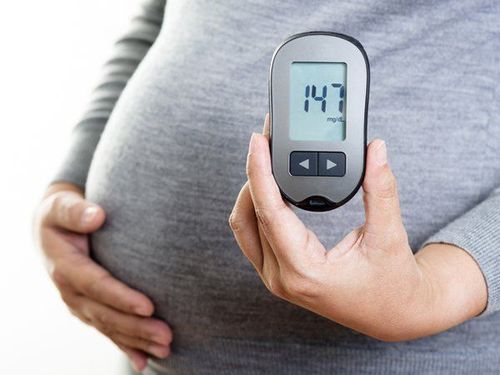This is an automatically translated article.
Gestational diabetes can lead to many complications for both mother and baby. Women who have had gestational diabetes in the past have an increased risk of recurrence in subsequent pregnancies.1. What is gestational diabetes?
Gestational diabetes (also known as gestational diabetes) is a glucose tolerance disorder that occurs in pregnant women. The disease was diagnosed during the second or third trimester of pregnancy and there was no evidence of prior type 1 or type 2 diabetes.Gestational diabetes usually goes away on its own after giving birth, but if the patient is still not cured within 6 weeks of giving birth, then this is not diagnosed as gestational diabetes but type 1 diabetes. , type 2 or symptomatic diabetes.
2. How dangerous is gestational diabetes?

Tiểu đường thai kỳ là căn bệnh nguy hiểm, có thể dẫn tới nhiều biến chứng cho cả mẹ và thai nhi
2.1 Complications for pregnant women Over 4 kg: Polyhydramnios is a condition in which there is too much amniotic fluid (over 1000 ml). , usually over 3000 ml), combined with a large fetus makes women uncomfortable or very painful before giving birth, having to have a cesarean section. Risk of high blood pressure, preeclampsia: this is a fairly common complication in pregnant women with diabetes. Vulnerable to postpartum hemorrhage There is a risk of fungal infections, urinary tract infections, nephritis, pyelonephritis. 2.2 Complications for the fetus Causing birth defects such as: nervous system (cerebrovascular system, hydrocephalus), urinary system (renal atrophy, renal cysts) and most commonly cardiovascular system malformations (atrial septal defect, inversion of major blood vessels) Poor fetal growth: fetuses in mothers with gestational diabetes, especially those with vascular complications, are often underdeveloped in utero, may due to poor perfusion or too tight maternal glycemic control Miscarriage or stillbirth: the main cause of stillbirth is congenital malformations, fetal respiratory failure or maternal acidosis. ketones. Some cases of fetal death are due to eclampsia or pre-eclampsia. Newborns born to mothers with gestational diabetes have complications such as: hypoglycaemia within 48 hours of birth, respiratory failure, hypocalcemia, hyperbilirubinemia, polycythemia vera, poor feeding, etc. .. Babies are born at high risk of developing type 2 diabetes later in life
3. Can gestational diabetes come back?

Thai phụ đã từng bị tiểu đường thai kỳ ở lần mang thai trước có nguy cơ sẽ mắc lại bệnh ở các lần mang thai tiếp theo
The risk of gestational diabetes in the above cases is quite high. The Ministry of Health recommends testing for diabetes at the first prenatal visit for those with high risk factors. The diagnosis of gestational diabetes is based on the results of the fasting blood sugar test and the results of the glucose tolerance test. Glucose tolerance test is a simple but very good technique in early detection of gestational diabetes to provide early prevention and treatment, to avoid adverse consequences during pregnancy. If you have unusual symptoms, you should be examined and consulted with a specialist.
Please dial HOTLINE for more information or register for an appointment HERE. Download MyVinmec app to make appointments faster and to manage your bookings easily.













